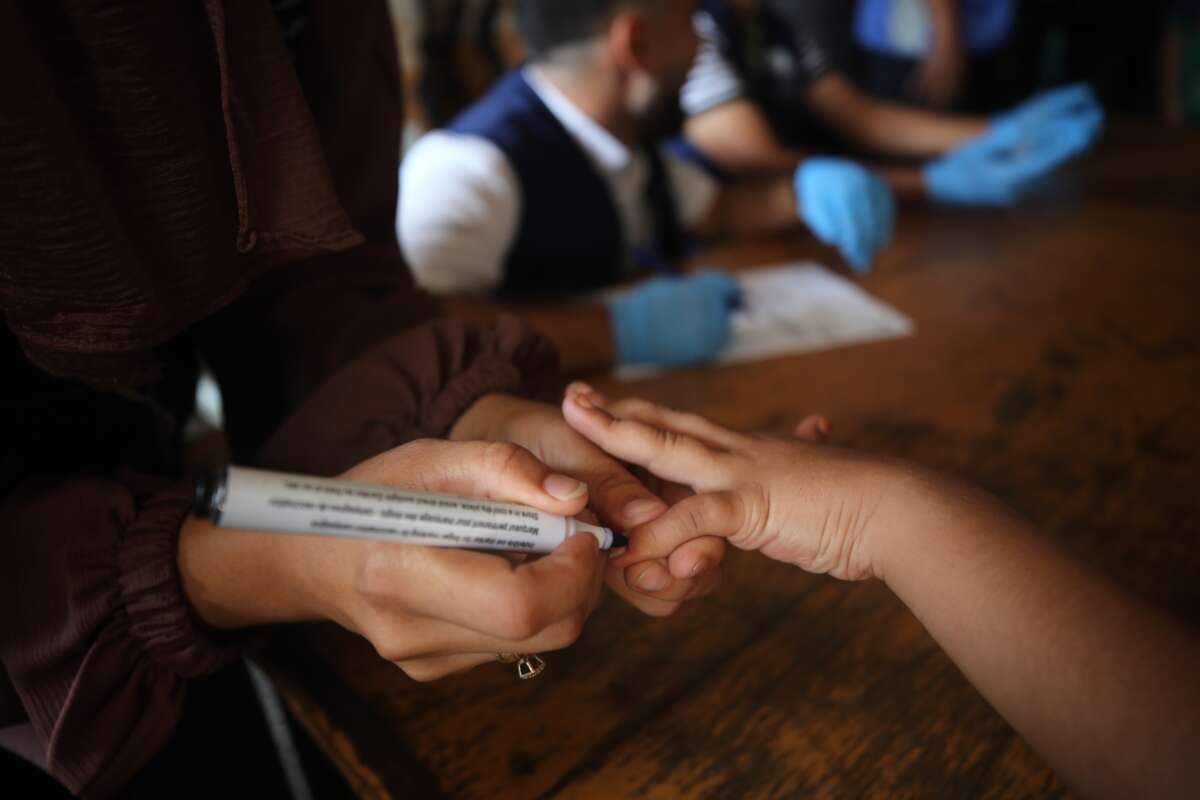Honest, paywall-free news is rare. Please support our boldly independent journalism with a donation of any size.
The Israeli military killed nearly a dozen people Sunday in its latest bombing of a school-turned-shelter in the Gaza Strip, an attack that came amid limited pauses aimed at allowing relief workers to vaccinate Palestinian children against reemergent polio.
Israel’s strike on the Safad school in Gaza City killed at least 11 people, including a woman and a girl, a spokesperson for Gaza’s civil defense agency told Agence France-Presse.
The Israeli military claimed it was targeting a “Hamas command center” inside the school, which — like other Gaza schools that remain standing — was being used as a shelter for people displaced by Israel’s nearly 11-month assault.
Philippe Lazzarini, commissioner-general of the United Nations Relief and Works Agency for Palestine Refugees in the Near East (UNRWA), said Monday that Israeli bombing has damaged or destroyed more than 70% of the schools it runs in the enclave.
“The vast majority of our schools are now overcrowded shelters with hundreds of thousands of displaced families. They cannot be used for learning,” Lazzarini continued. “With no cease-fire, children are likely to fall prey to exploitation including child labor and recruitment into armed groups. We have seen this way too often in conflicts around the world, let’s not repeat it in Gaza.”
“A cease-fire is a win for all: it will allow respite for civilians, the release of the hostages, and a flow of much-needed basic supplies including for learning,” he added.
A school shelter in Gaza City was hit by an Israeli military air strike as a ‘pause’ in attacks began in other areas in Gaza under an agreement to allow a polio vaccination campaign. pic.twitter.com/Brl4ubHkjC
— Al Jazeera English (@AJEnglish) September 2, 2024
The deadly attack came at the start of three days of localized humanitarian pauses to allow U.N. aid workers to vaccinate Palestinian children against polio amid growing fears of a mass outbreak of the infectious disease that has no known cure.
Last month, Gaza health officials detected the first polio case in more than two decades, heightening the urgency of a large-scale vaccination campaign — an effort made highly difficult by the Israeli military’s relentless bombing and destruction of Gaza’s healthcare infrastructure.
UNRWA said early Monday that its teams were able to vaccinate roughly 87,000 children on the first day of negotiated pauses even as Israeli airstrikes continued across the besieged enclave.
The Euro-Mediterranean Human Rights Monitor said in a statement Sunday that “Israeli aircraft and tanks continue to bomb the central Gaza Strip, the area where the polio vaccination campaign has begun.”
“Along with the ongoing shelling in various parts of the strip, these Israeli military attacks have coincided with the peak of families’ movement with their children towards the designated vaccination centers,” the group said. “Some of these attacks have even targeted locations near the vaccination centers, endangering the progress of the vaccination process that is required to stop the poliovirus from spreading among Palestinian children in the besieged enclave.”
Louise Wateridge, a senior communications officer for UNRWA, told the BBC on Monday morning that “we cannot vaccinate children who are fearing for their lives.”
“We cannot vaccinate children and families who have to flee for safety,” said Wateridge as explosions rang out in the background. “We need these children to be able to come to the vaccination centers and receive these vaccines safely. And that’s not possible when there’s fighting like there is now.”
Speaking against the authoritarian crackdown
In the midst of a nationwide attack on civil liberties, Truthout urgently needs your help.
Journalism is a critical tool in the fight against Trump and his extremist agenda. The right wing knows this — that’s why they’ve taken over many legacy media publications.
But we won’t let truth be replaced by propaganda. As the Trump administration works to silence dissent, please support nonprofit independent journalism. Truthout is almost entirely funded by individual giving, so a one-time or monthly donation goes a long way. Click below to sustain our work.
